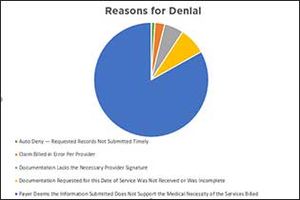Target, Probe and Educate (TPE) is one of the many types of audits conducted by the Center for Medicaid and Medicare Services (CMS) requesting documentation. They focus on physicians who they deem most likely to submit noncompliant claims based on data analysis. Currently, these are pre-payment requests for records. Following a hiatus during the public health emergency (PHE), TPE requests for records have begun again.
Process
Goal is to reduce high denials and lower error rates through chart review and education. There are up to three rounds of prepayment probe review.
Both physicians and facilities are subject to TPE requests for records.
Notification
The request for records from your Medicare Administrative contractor (MAC) arrives via mail. Date stamp the envelope that shows the postmark date as well as the letter. Forty-five days are given to comply with a records request. If additional time is needed, make the request early. Never request an extension within a few days of the due date. What happens if you don’t respond to the record request? CMS notifies a Recovery Audit Contractor (RAC) or Unified Program Integrity Contractor (UPIC) to investigate.
The notification will include these requests:
- The CPT code to be reviewed
- The reason for review
- Additional documentation request (ADR)-related information. Provide everything that is on the list. Failure to do so is cause for a second round of review.
Reviews
Cataract surgery is the hot topic now. Protect your revenue by implementing the cataract checklist (link to checklist in the Cataract/Anterior Segment module)
Between 20 to 40 records are requested. If some claims are denied, you will be invited to a one-on-one educational session. This can be accomplished with teleconference calls, electronic visits using webinar technology or letters and/or physician documentation report cards. If compliant, you will not be reviewed again for a least one year on the selected topic.
If the physician doesn’t pass the first round, there are a minimum of 45 days between each education intervention and next round to improve. If noticeable improvement is made demonstrating compliance, a subsequent round may not be necessary.
MACs have 30 days to review the documentation before notifying you of the outcome. A closing letter includes notification of any subsequent round.
If high error rates continue, you may be referred to CME for additional action, which may include:
- 100% prepayment review
- Extrapolation
- Referral to UPIC, RAC
Being selected for TPE does not mean you are excluded from other CMS records reviews. You can also be subject to:
- Automated reviews
- Comparative billing reports
- Mandated demand bill reviews
- Other pilot review strategies such as Quality Integrity Organizations (QIO)
Reason for Denial
Palmetto, the MAC in region JJ (Alabama, Georgia, Tennessee and JM- North Carolina, South Carolina, Virginia and West Virginia), has already published results of its initial TPE regarding cataract surgery. The denial rate of between 20 to 40 cataract cases was 26.67%. Reasons for denial?
- 82.26% did not document all the items on the cataract surgery checklist that demonstrated the medical necessity for the surgery
- 7.53% of claims filed did not include all that was asked for in the ADR.
- 5.38% of the physician’s signature was missing or unidentifiable.
- 2.69% were submitted in error. Perhaps the patient canceled surgery at the last minute, but the surgery was submitted for payment anyway.
- And lastly, 1.08% were automatically denied because records were not submitted within the 45-day window. These physicians will be referred to RAC or UPIC for further action.

Real Life Audit Experience
Practice administrators share their deficiency experiences:
- Our problem is the perpetual cloning of complaints identical from patient to patient. We are addressing the need for unique patient lifestyle complaints.
- Facility coded surgery as 66982 and surgeon coded as 66984. Chart notes and operative report confirmed 66984 was the correct code selection.
- Sometimes patients want to think about cataract surgery and then call later to schedule. Sadly, all the documentation criteria was not met at that initial exam and a subsequent exam or documented communication with the patient was never performed.
Academy Resources
Academy
Audits webpage.
aao.org/audits. Requires Academy or AAOE membership to access.
Video:
Cataract Documentation ChecklistIn this short video, Ravi Goel, MD presents a cataract surgery documentation checklist to prepare practices for TPE audits.